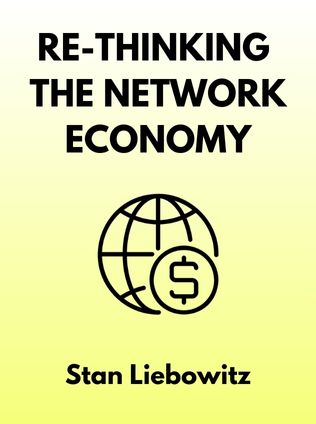
Re-Thinking the Network Economy
The True Forces That Drive the Digital Marketplace
By Stan Liebowitz
Published 09/2002
About the Author
Stan Liebowitz is a renowned economist and professor of managerial economics at the University of Texas at Dallas. His work spans several critical areas of economics, including the intersection of technology and market behavior. Liebowitz is particularly noted for his critical analysis of the economic implications of new technologies, making him a prominent voice in discussions about the digital economy. In "Re-Thinking the Network Economy," he brings his extensive knowledge to bear on the misconceptions surrounding the Internet's impact on traditional economic principles. His clear, engaging style makes complex economic concepts accessible to a wide audience, from students and academics to business professionals.
Main Idea
The main premise of "Re-Thinking the Network Economy" is that despite the transformative nature of the Internet, traditional economic principles still apply. Stan Liebowitz argues that many early Internet companies failed because they disregarded basic economic concepts, such as the laws of supply and demand, economies of scale, and the importance of customer service. The Internet, he contends, offers significant business opportunities, but only for those who adhere to sound economic strategies. He emphasizes that success in the digital marketplace requires a deep understanding of these principles rather than a blind rush to capitalize on the latest technological trends.
Table of Contents
- Basic Economics of the Internet
- Racing to Be First
- The (Non)Ubiquity of E-Tailing
- Is Creating Value Profitable?
- Can Advertising Revenue Support the Net?
- Copyright and the Internet
Basic Economics of the Internet
In the opening chapter, Liebowitz challenges the notion that the Internet fundamentally changes the rules of economics. He asserts that the Internet's primary economic contribution is the reduction of information transmission costs. This capability, while revolutionary, does not negate traditional economic laws. The chapter explores the concept of network effects, which occur when a product's value increases as more people use it. Liebowitz points out that not all Internet products benefit from network effects. For example, a communication tool like email gains value with more users, but a niche software application might not.
"Network effects occur when a product becomes more useful to consumers in proportion to the number of consumers using that product." - Stan Liebowitz
He also discusses economies of scale, which allow companies to lower their average costs as production increases. This concept is crucial for Internet companies aiming to grow quickly to achieve a competitive advantage. However, Liebowitz cautions against assuming that economies of scale will always lead to market dominance. Quality, customer service, and other factors remain critical for long-term success.
Sign up for FREE and get access to 1,400+ books summaries.
You May Also Like
Rich Dad Poor Dad
What the Rich Teach Their Kids About Money - That the Poor and Middle Class Do Not!
By Robert T. KiyosakiFreakonomics
A Rogue Economist Explores the Hidden Side of Everything
By Steven D. Levitt and Stephen J. DubnerThe Lean Startup
How Today's Entrepreneurs Use Continuous Innovation to Create Radically Successful Businesses
By Eric RiesWho Moved My Cheese?
An Amazing Way to Deal with Change in Your Work and in Your Life
By Spencer Johnson, M.D.Factfulness
Ten Reasons We're Wrong About the World – and Why Things Are Better Than You Think
By Hans RoslingMake Your Bed
Little Things That Can Change Your Life...And Maybe the World
By William H. McRaven



















